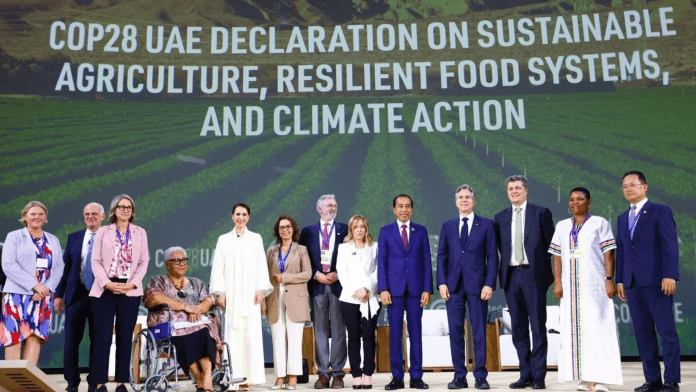The Leaders Declaration on Food Systems, Agriculture, and Climate Action was signed by over 130 countries during COP28 in the UAE on December 1. This historic agreement represents the first-ever pledge to reduce carbon emissions within the worldwide food system.
The news was announced by Miriam Almheiri, UAE Minister of Climate Change and Environment, during the World Action Summit in Dubai.
In a statement at the event, Almheiri described the global commitment as “a milestone moment in history for food systems and agriculture”.
She added, “This declaration is there to help galvanise the political will needed from countries across the globe to transform our food systems in the face of climate change.”
The comprehensive roster of countries that have signed the agreement during COP28 has not been disclosed, but it is indicated to “encompass a total estimated population of 5.718 billion people, calculated using World Bank population figures.”
According to BBC reports, the participation of countries such as the US, China, and Brazil is indicated. In November, the EU Commission formally requested approval from the European Council of Ministers to sign the Declaration.
Leaders from Indonesia, Italy, Samoa, and the United States spearheaded the “special session” of the World Action Summit.
The UN Food and Agriculture Organization (FAO) backed the formulation of the declaration, emphasizing its role in fostering “the expansion of resilience initiatives, advancing food security, and providing support to workers in the sector.”
As part of the agreement, signatories are said to have promised “to revisit policies, increase access to finance, accelerate innovations and strengthen the multilateral trading system”, the FAO said.
It added a “collaboration and progress review” is expected to occur at COP29, “with ongoing commitment” due to continue “beyond 2025”.
During COP28, a new report from the FAO was unveiled, urging increased financial support to address the escalating loss and damage suffered by the agrifood sector due to the impacts of climate change.
In its evaluation of Nationally Determined Contributions (NDCs), the FAO discovered that 35% of current climate action objectives include references to “loss and damage.” The countries acknowledging “loss and damage” in their reports also highlighted agriculture as “the single most impacted sector overall.”
The unveiling of the report comes in the wake of world leaders’ agreement on the creation of a Loss and Damage Fund during the first day of COP28.
Commenting on the overall declaration, Jennifer Morris, CEO of environmental NGO The Nature Conservancy said, “We applaud the COP28 presidency and all 134 signatories for taking this important step to integrate food systems into the climate action.”
“[It] acknowledges, at the highest levels, that by integrating food and agriculture into key climate goals and scaling up finance and science-backed solutions, we can ensure there is real tangible action toward reaching the Paris Agreement Goals as well as halting biodiversity and nature loss.”
While a step forward, Morris stressed the declaration “will only be meaningful if we see follow-through on the ground”,
She added, “The 134 countries who have committed to the Declaration will need to work with every actor in the food system to deliver real lasting change, as well as immediately phase out fossil fuel use both within and outside of the food economy.
“By ensuring that farmers and producers are at the centre of the solution, food systems can be part of the climate solution, and support farming communities and livelihoods. Only then will we see the results needed to meet this challenge.”
ProVeg International, a group dedicated to raising awareness about food systems, expressed great satisfaction with the news. They expressed hope that it would stimulate increased attention towards addressing the emissions stemming from livestock production.
“The food system emits a third of global greenhouse gases and most of that comes from animal agriculture. So we now hope signatories to the declaration will look at ways to promote the production and consumption of plant-based, climate-friendly food to honour the goals of the declaration,” said Raphaël Podselver, director of UN affairs at ProVeg International.
Danone, a prominent player in the dairy industry, has embraced the declaration, and CEO Antoine de Saint-Affrique commended the elevation of “food being on the top table for the first time.”
Among the 26 organizations announced by COP28 today, the company is recognized for its collaborative efforts to transition 160 million hectares of land to regenerative agriculture by 2030. Notable food industry players mentioned in the list include Nestlé, PepsiCo, ADM, Unilever, Sysco, and Olam Food Ingredients.
In a statement, de Saint-Affrique added, “Solutions, like regenerative agriculture, to reduce those numbers already exist but they must be scaled as fast as we can. That cannot happen without greater financing. In 2022, food systems only received 4.3% of climate finance despite generating 1/3 of emissions.
“Public-private partnerships must work harder to unlock the financing farmers need to spearhead the transition. As part of the Global Methane Hub [GMH], $200m of funding has already been raised for new technologies for less carbon intensive farming methods. It can be done.”
Last month, Danone revealed its intention to finance the emissions reduction accelerator of the GMH.
“This declaration is a signal to all actors to scale financing, collaboration and policies so our food systems are more secure, equitable and better for the planet,” de Saint-Affrique said.
A spokesperson for the company stated that a “supporting action package” from affiliated businesses would be unveiled this upcoming Monday.





